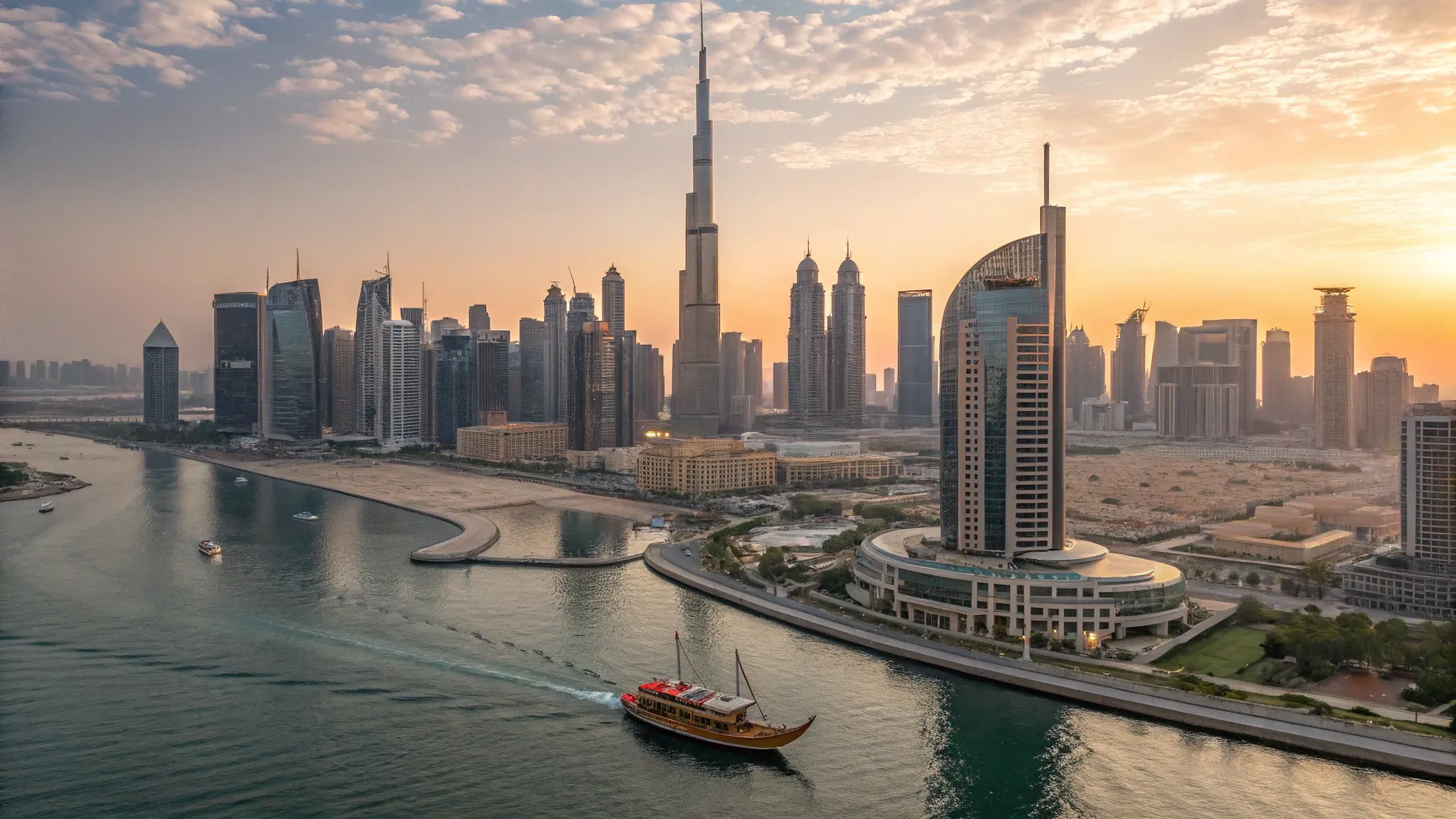- Blog
- how to set up mainland company dubai
How to Set Up a Mainland Company in Dubai | 2026 Guide
![How to Set Up a Mainland Company in Dubai: A Comprehensive Guide [2025]](https://media.justmovedubai.com/How to Set Up a Mainland Company in Dubai A Comprehensive Guide [2025].webp)
Learn how to set up a mainland company in Dubai with our 2026 guide. Discover 100% foreign ownership benefits, costs, and step-by-step registration instructions.
Founder of JustMove
Summarize content with
Get AI-powered insights and summaries of this article
Just Move is the preferred partner of entrepreneurs
Expert in incorporation, accounting and immigration
Trusted by over 500+ entrepreneurs
4.9/5 reviews from our clients
100% satisfaction across all services
Dubai has solidified its status as the premier global business hub in 2026, offering unparalleled access to international markets. For entrepreneurs, SMEs, and investors looking to expand, understanding how to set up mainland company dubai is the first step toward long-term success. This guide is specifically designed for ambitious founders who want to bypass traditional bureaucratic hurdles and transition into the modern, digital-first era of company formation in dubai.
Establishing a dubai mainland company provides the unique advantage of operating across the entire UAE without territorial restrictions. Whether you are a local applicant or an international investor, this comprehensive walkthrough simplifies the complex steps to start a business. We will cover everything from initial legal structures like a joint-stock company to the final requirements for a business licence and corporate banking.
At Just Move, we believe mainland uae company formation should be a seamless, 100% online experience. In this guide, we analyze the feasibility of different sectors and provide a roadmap for the modern resident or newcomer to start a business on the mainland. You will learn how to navigate mainland company dubai regulations while securing your dubai mainland license and completing your dubai mainland company setup in as little as 1 to 5 business days.
Success starts with choosing the right legal framework to ensure your enterprise thrives in this competitive landscape.
What is a Dubai Mainland Company and Why It Matters
Understanding how to set up mainland company dubai begins with defining the legal framework that powers the city’s economy. A Dubai mainland company is a business entity registered under the Department of Economic Development (DED) in Dubai. This specific structure serves as the backbone of the local economy, allowing a resident or international investor to engage directly with the UAE’s domestic market without the geographic limitations found in other setups.
For an applicant looking to start a business on the mainland, the primary draw is the Dubai mainland license. This license allows entrepreneurs to conduct business activities inside and outside the UAE, and is issued by Dubai's Department of Economic Development (DED). Unlike other jurisdictions, a mainland company dubai provides unrestricted access to the UAE market, allowing direct engagement with local consumers and clients across all seven emirates.
Recent changes in UAE law allow for 100% foreign ownership of mainland companies in most sectors, removing the previous requirement for a mandatory UAE national partner. This shift in company formation in dubai means that an entrepreneur can retain full control of their business. These reforms specifically aim to attract global industries such as technology, AI, pharmaceuticals, and life sciences by removing ownership restrictions.
Maximizing the Benefits of a Dubai Mainland Company Setup
Setting up a mainland company in the UAE offers unparalleled business flexibility, operating in various sectors with fewer constraints compared to free zone entities. As of 2026, the process has become even more digitalized, allowing founders to manage their business licence requirements with minimal paperwork.
Operational Freedom: Mainland uae company formation allows you to operate anywhere within the UAE and abroad. Your business is not restricted to specific zones, which means you can trade directly with the UAE market and take on government contracts.
Government Contracts: Mainland companies can bid for and secure lucrative government contracts. This is a critical advantage for those in construction, tech, or consultancy that is generally not available to free zone businesses.
Scalability: The ability to add visas as your team grows is a key feature of mainland company formation dubai. You can also own or rent physical office spaces anywhere in the city, providing the flexibility needed for high-growth ventures.
Profit Repatriation: Key benefits of 100% foreign ownership include full control over operations, a simplified legal structure, and the freedom to repatriate profits. This ensures that investors have total security over their financial success and enhanced IP protection.
Tax Efficiency: While operating as a DED entity, businesses can still benefit from the UAE’s competitive tax landscape. For example, any applicant can still utilize the Small Business Relief if they meet the revenue criteria, ensuring that growth remains the priority through 2026. To better understand your initial investment, estimate your Dubai business setup cost in 60 seconds.
When you plan the steps to start a business, the physical presence of your entity matters. Whether you are a startup or an established SME, having a mainland presence demonstrates long-term commitment to the region. This trust factor is essential when you visit potential partners or negotiate with local suppliers.
Navigating these regulations requires a clear understanding of the administrative landscape. Knowing the precise sequence of approvals ensures that your license is issued efficiently and without unnecessary delays. While the structural advantages are clear, the actual journey from conceptualization to the final issuance of your trade license involves a specific set of procedural milestones.
Prerequisites: What You Need Before You Start
Successfully mastering how to set up mainland company dubai requires a high level of preparation before the formal application begins. While the Department of Economy and Tourism (DET) has streamlined the process for 2026, certain foundational prerequisites remain non-negotiable for every applicant. This phase determines the long-term feasibility of your enterprise and ensures that your dubai mainland company setup adheres to current federal regulations.
Establishing Your Initial Residency Status
To start a business on the mainland, the primary founder or applicant must be physically present or have a legal entry record in the country. A specific recommendation for any international entrepreneur is that you must hold a valid tourist or visit visa before applying for a license.
This entry record serves as the basis for your initial file creation within the immigration systems. It is essential to conduct a preliminary check on your personal visa history to ensure no previous conflicts or expired entries hinder your company formation in dubai.
Essential Documentation and Arabic Translation Requirements
The steps to start a business become more complex when the shareholder is a corporate entity rather than an individual. If you are establishing a branch of a foreign entity, the administrative burden increases significantly. You must prepare several specific documents to satisfy the requirements of mainland company formation dubai:
- Attestation: Parent company documents for foreign or free zone branches must be attested in the home country by the UAE Embassy and the Ministry of Foreign Affairs.
- Translation: All parent company documents must be legally translated into Arabic and attested by the UAE Ministry of Justice.
- Verification: This includes the Certificate of Incorporation, Memorandum of Association, and the Board Resolution authorizing the mainland uae company formation.
The UAE legal system operates primarily in Arabic for all official registrations, meaning precise translations are vital to avoid delays. Any errors in the translation phase can result in the rejection of your dubai mainland license application.
Selecting Activities for Your Dubai Mainland License
One of the most critical phases in mainland company dubai creation is defining what your company will actually do. The scope of your business licence is dictated by your chosen activities, which determine your regulatory requirements and physical space needs.
There are over 2,000 business activities to choose from in the UAE, and an investment can have more than one business activity. This diversity allows for significant operational flexibility, but it requires a strategic approach to ensure your license remains future-proof.
Selecting the right combination ensures that your dubai mainland company can scale without needing frequent, costly license amendments as you enter new markets. Once these activities are finalized and your documents are attested, you are ready to move into the structural phase of the application.
The Step-by-Step Mainland Setup Process
The process for how to set up mainland company dubai has been refined into a highly efficient digital journey. According to current Department of Economy and Tourism (DET) standards, the steps to start a business include selecting your business activity, reserving a trade name, completing licensing and registration, processing visa applications, and opening a corporate bank account.
The core workflow for a mainland company dubai is now categorized into three main steps: defining your business activity, obtaining initial approval from the DED, and submitting the formal trade license application. This structural clarity ensures every applicant understands exactly where they stand in the formation pipeline.
Navigating the Dubai Mainland License Workflow
For entrepreneurs seeking the fastest possible entry, the Bashr platform enables investors to establish their businesses in the UAE in 15 minutes through an integrated digital service. While this digital fast-track is revolutionary, most complex commercial setups benefit from a more personalized approach to ensure long-term feasibility.
A typical mainland company setup in Dubai can be completed within 7 to 14 days, provided no external approvals are needed from third-party ministries. During this window, you will finalize your legal structure, whether it is a sole establishment or a limited liability company (LLC), ensuring your business licence aligns with your specific industry codes.
At Just Move, we often expedite this further, typically securing license issuance in 1–5 business days for our clients. By managing the documentation 100% online, we remove the friction often associated with mainland uae company formation, allowing you to focus on your operational launch rather than administrative hurdles.
Finalizing the Mainland Company Formation Dubai Requirements
Once your license is active, the focus shifts toward securing residency. Every resident and investor must undergo a medical fitness test and biometric scanning to receive their Emirates ID. This is a critical component of company formation in dubai that permits you to legally live and work within the emirates.
At this stage, you must also prepare for the 2026 compliance landscape. If your revenue exceeds 375,000 AED, you must monitor the threshold for mandatory VAT registration. Additionally, all B2B operations must prepare for the new Electronic Invoicing System rollout scheduled for July 2026, which requires using accredited digital platforms.
The final pillar of your dubai mainland company setup involves opening a corporate bank account. This requires presenting your validated trade license and a proof of address, such as a utility bill or bank statement, which is now a mandatory requirement for setup in 2026. Just Move manages this banking assistance to ensure the entire journey, from license to account, stays under a 30-day timeline.
With the legal and financial foundations firmly in place, your attention must turn to the physical and logistical requirements that will house your new enterprise.
Common Pitfalls and Pro Tips for 2026
Navigating the complexities of how to set up mainland company dubai requires more than just submitting paperwork; it demands strategic foresight to avoid common regulatory traps. Many entrepreneurs underestimate the importance of precise activity classification, which can lead to significant delays if the Department of Economy and Tourism (DET) requires unforeseen external approvals.
Avoiding Strategic Errors in Your Mainland Company Dubai Setup
Selecting the correct activity is the foundation of a successful mainland company dubai. Every applicant must ensure their chosen code matches their actual operations to prevent penalties or licensing rejections. This is particularly relevant for complex structures like a joint venture or a stock company where legal requirements are more stringent.
Conducting a feasibility study before beginning your dubai mainland company setup helps determine if a dubai mainland license is the most cost-effective path for your specific goals. It is often beneficial for a prospective business owner to visit the proposed office site to ensure it meets DED physical space requirements, as a physical lease is mandatory for mainland entities.
Maximizing Efficiency in Company Formation in Dubai
The landscape of mainland uae company formation is changing rapidly in 2026 with new digital mandates. To start a business on the mainland successfully, entrepreneurs must understand the financial milestones that trigger compliance obligations, such as VAT registration and the new e-invoicing rules.
- Tax Planning: Monitor the 375,000 AED revenue threshold for mandatory VAT registration. Additionally, remember to elect for Small Business Relief (SBR) in your 2026 tax filing to maintain a 0% tax rate on profits if your revenue is under 3 million AED.
- Digital Onboarding: Just Move works by streamlining the steps to start a business into a 100% online journey. This eliminates the need for physical paperwork and reduces the risk of non-compliant structures, such as illegal freelance visas.
- Licensing Discounts: When securing your business licence, consider a multi-year renewal. Just Move helps clients secure a 20% discount on the license cost when opting for a 3-year term.
A resident business owner who prioritizes these digital-first strategies will find that mainland company formation dubai becomes a competitive advantage rather than an administrative burden. Ensuring these financial and legal pillars are stable allows you to focus entirely on the operational growth and market entry of your enterprise.
Once the legal structure and compliance frameworks are established, the next logical phase involves managing the specialized requirements for your workforce and banking infrastructure.
Frequently Asked Questions
What are the 2026 requirements for how to set up mainland company dubai?
The process for how to set up mainland company dubai requires selecting a business activity, reserving a trade name, and obtaining initial approval from the Department of Economy and Tourism (DET). These steps to start a business are now primarily managed through digital portals, allowing for a business licence to be issued in as little as 1 to 5 business days. Just Move facilitates this entire dubai mainland company setup to ensure compliance with the latest 2026 regulations.
How much does it cost to set up a mainland company in Dubai?
Setting up a mainland company in Dubai costs between AED 15,000 and AED 25,000 for the license registration fees depending on the activity. This initial investment covers the dubai mainland license and trade name reservation but excludes the cost of a physical office lease and residency visas. Just Move provides transparent, all-inclusive pricing with no hidden fees to help entrepreneurs manage their company formation in dubai effectively.
Can a foreigner set up a company in Dubai?
Foreigners can own 100% of a mainland company dubai for the vast majority of commercial and industrial activities under current UAE law. Every international applicant or resident must provide a valid passport and proof of address, such as a utility bill, to complete the registration. This framework allows investors to establish a permanent presence after their initial visit without needing a local Emirati partner.
How much money do you need to start a company in Dubai?
Starting a company in Dubai requires no mandatory minimum share capital for most Limited Liability Company (LLC) structures in 2026. Investors should instead focus on the feasibility of their operations by budgeting for licensing fees, office space, and mandatory electronic invoicing systems. While a joint stock company may have specific capital requirements, most startups can launch with a mainland uae company formation strategy that prioritizes cash flow.
What are the tax obligations for a mainland company in 2026?
Mainland companies are subject to a 9% corporate tax on net profits that exceed the 375,000 AED threshold. However, if your annual revenue remains below 3,000,000 AED, you can elect for Small Business Relief to maintain a 0% tax rate through the end of 2026. Accurate financial reporting is now mandatory for all entities to ensure successful license renewal and maintain compliance with the federal tax authority.
While these regulatory answers provide the framework for entry, the long-term operational advantages of the UAE's economic landscape offer even deeper strategic value for growing enterprises.
Ready to Launch Your Dubai Mainland Business?
Securing a dubai mainland license is the definitive step for any applicant looking to scale their operations in 2026. This legal structure allows a mainland company dubai to trade across the entire UAE and globally without territorial restrictions. While the steps to start a business involve navigating digital mandates like the July 2026 e-invoicing rollout, the long-term rewards of mainland company formation dubai remain significant.
For every resident or international applicant who chooses to visit for their setup, we ensure a transparent, digital journey. Just Move streamlines mainland uae company formation by managing the entire process online, from initial DET approvals to residency visas. Our 100% online approach ensures your business licence is issued in 1 to 5 business days, making dubai mainland company setup efficient and predictable.
As you consider the feasibility of your expansion, remember that company formation in dubai is faster than ever. If you are ready to master how to set up mainland company dubai, let Just Move provide the expert guidance and digital tools needed for a seamless launch.
Founder of JustMove
Kasia is a renowned expert in business setup and relocation services in Dubai. With a proven track record as a top-performing account executive at PayPal and co-founder of luxury concierge service Alotea, she brings a wealth of experience to her role at JustMOVE. Kasia's deep understanding of the UAE market, extensive international connections, and multilingual capabilities (English, Polish, Russian, and French) make her an authority in navigating the complexities of business setup and relocation. Through the JustMOVE blog, Kasia shares her insights and practical advice to help entrepreneurs and families establish and grow their presence in the UAE. Her commitment to delivering personalized, transparent, and efficient solutions has earned her the trust of countless clients.
Check out more related articles

By Kasia

By Kasia
![Moving to Dubai from the US: Your Complete Guide [2025]](https://media.justmovedubai.com/Moving to Dubai from the US Your Complete Guide [2025].webp)
By Kasia

By Kasia

By Kasia

By Kasia